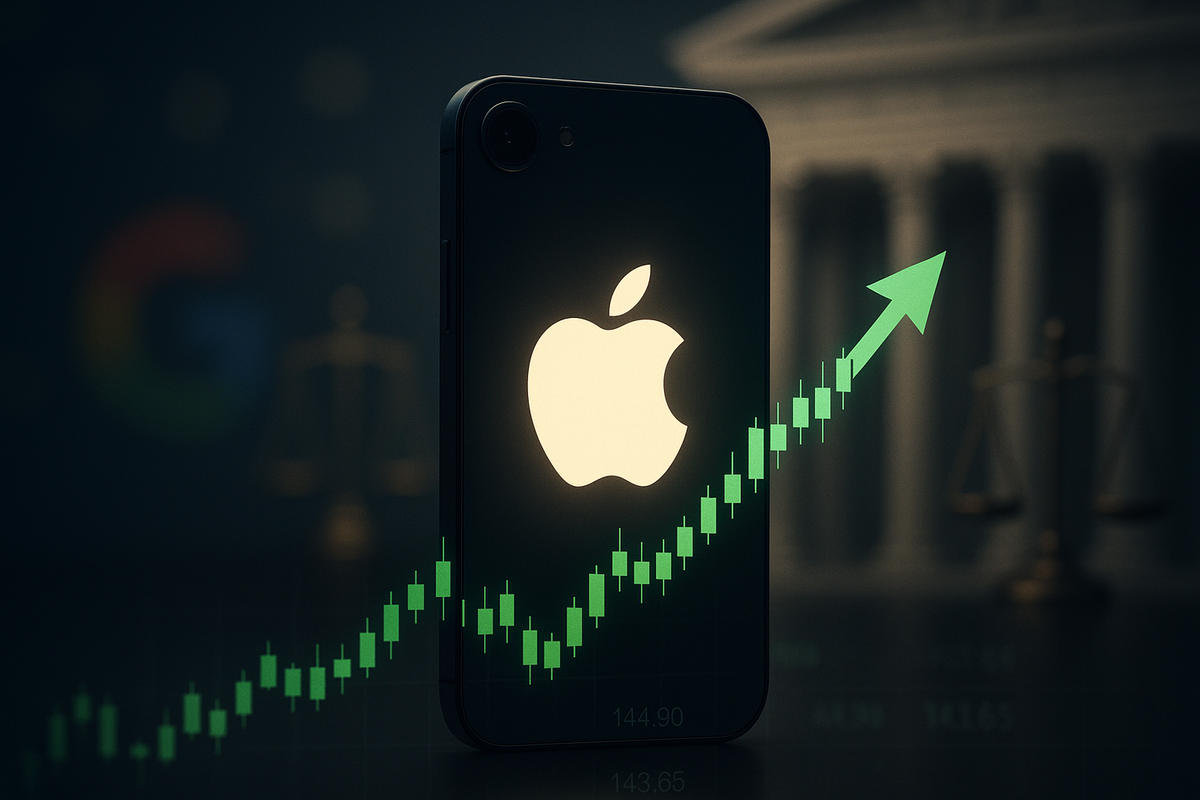
Apple Inc. (NASDAQ: AAPL) shareholders are celebrating a significant victory following a U.S. District Court's pivotal ruling in the Department of Justice's (DOJ) antitrust case against Alphabet (NASDAQ: GOOGL) subsidiary Google. The decision, widely lauded by analysts as a "net positive" and a "monster win" for Apple, has sent its stock surging, reinforcing investor confidence in the tech giant's financial stability and strategic positioning. At the heart of this jubilation is the court's decision to preserve Google's multi-billion dollar annual revenue-sharing agreement with Apple, a critical component of Apple's burgeoning services revenue.
The ruling has swiftly removed a major regulatory overhang that had cast a shadow over Apple's stock, leading to an immediate positive market reaction. Investors had been keenly watching the proceedings, fearing a potentially disruptive outcome that could have jeopardized one of Apple's most lucrative partnerships. Instead, the court's nuanced decision not only maintained the status quo on these crucial payments but also introduced new dynamics that could further empower Apple in its future negotiations with Google and potentially other search providers.
A Legal Verdict with Far-Reaching Market Implications
The U.S. District Court's decision on the Department of Justice's antitrust case against Google marked a watershed moment for the tech industry, culminating years of legal battles and regulatory scrutiny. The central concern for Apple, and indeed for the broader market, revolved around Google's payments to Apple for making Google the default search engine on Safari, Apple's proprietary web browser. These payments, estimated to be around $20 billion annually, constitute a substantial portion of Apple's services revenue, a segment that has been a key driver of the company's growth and profitability in recent years.
The timeline leading up to this moment began in October 2020, when the DOJ first filed its landmark antitrust lawsuit against Google, accusing the search giant of maintaining an illegal monopoly in the search and search advertising markets through anticompetitive practices. A significant part of the government's argument focused on the exclusive agreements Google had with device makers and web browsers, including Apple. The DOJ contended these agreements stifled competition and innovation. Key players involved included the Department of Justice, lead by Attorney General Merrick Garland, Google, represented by its legal team, and indirectly, Apple, whose business model was deeply intertwined with the outcome.
Initial market reactions to the ruling were overwhelmingly positive for Apple. Its shares rose significantly, reflecting the relief that the most severe penalties—such as a ban on the revenue-sharing agreement or a forced breakup of Google—were avoided. Judge Amit Mehta, who presided over the case, explicitly acknowledged that "cutting off payments from Google almost certainly will impose substantial—in some cases, crippling—downstream harms to distribution partners," thereby justifying the preservation of these critical financial flows. This judicial reasoning underscored the intricate and interdependent nature of the modern tech ecosystem, where even seemingly dominant players rely on symbiotic relationships. The market quickly priced in the certainty and continued revenue stream for Apple, solidifying its position as a major beneficiary of the ruling.
Tech Titans Face New Landscape: Apple Gains Leverage, Google Retains Core
The U.S. District Court's ruling in the Google antitrust case has created a reshaped competitive landscape, producing clear winners and losers, with Apple (NASDAQ: AAPL) emerging as a primary beneficiary, while Alphabet (NASDAQ: GOOGL) navigates a new era of regulated competition. The core of the decision, which avoided a breakup of Google but imposed significant behavioral remedies, directly impacts the business models and future strategies of these tech giants.
For Apple, the ruling is an unadulterated win. The court's decision to permit Google to continue paying Apple an estimated $20 billion annually to be the default search engine on Safari safeguards a critical and ever-growing revenue stream for Apple's Services segment. This segment has been a cornerstone of Apple's financial performance, diversifying its income beyond hardware sales. The preservation of this payment structure provides significant financial stability and ensures Apple's continued robust growth in its high-margin services offerings. Furthermore, the prohibition on exclusive default contracts could enhance Apple's negotiating power. Apple is now free to entertain bids from other search providers like Microsoft's (NASDAQ: MSFT) Bing or emerging AI-driven search companies, potentially securing even more favorable terms or offering users a broader choice of default search engines. This newfound flexibility also extends to AI integration, allowing Apple to integrate non-Google AI assistants or chatbots alongside Google Search, or even deepen its collaboration with Google's Gemini AI without restrictive contractual limitations.
Google, while avoiding the worst-case scenario of a breakup or divestiture of key assets like Chrome or Android, faces a more competitive environment. The ability to continue paying for default search placements means Google can maintain its significant market share, but the ban on exclusive contracts transforms its "moat of exclusivity... into a marketplace for defaults." Google will now have to actively compete for these crucial placements, potentially incurring higher costs or facing more robust challenges from rivals. The mandate to share portions of its search index and certain user interaction data with "qualified competitors" also presents a long-term challenge. This data-sharing requirement aims to empower rivals, particularly AI-driven search platforms, by providing them with crucial information to improve their algorithms and potentially erode Google's market lead. Google's stock initially surged, climbing approximately 7-8%, reflecting investor relief that a breakup was avoided and its core business model preserved. However, its long-term performance will hinge on its ability to adapt to increased competition and innovate within these new regulatory constraints, particularly in the rapidly evolving AI landscape.
Beyond these two titans, other players stand to gain. Google's competitors, including Microsoft's (NASDAQ: MSFT) Bing, DuckDuckGo, and newer AI-driven search platforms like OpenAI (NYSE: OPENAI) and Perplexity, are significant beneficiaries. The data-sharing mandate lowers barriers to entry and provides these companies with crucial information to improve their offerings. The end of exclusivity also opens new distribution avenues, potentially allowing them to secure default status on devices and browsers where they were previously locked out. Device manufacturers and browser developers, such as Samsung (KRX: 005930) and Mozilla, which previously had exclusive deals with Google, now possess greater flexibility. They can negotiate with multiple search providers, potentially increasing their revenue from default placement agreements. Conversely, the Department of Justice and some antitrust advocates, while securing a victory in proving Google's monopolistic behavior, expressed disappointment that more stringent structural remedies, such as a breakup, were not imposed. Both Google and the DOJ have indicated plans to appeal aspects of the decision, suggesting the legal saga is far from over.
Industry Shifts and Broader Implications: A Catalyst for Competition and Innovation
The U.S. District Court's ruling against Google reverberates far beyond the immediate financial impact on Apple and Google, signaling a significant shift in the broader tech industry and setting potential precedents for future regulatory actions. This event fits squarely into a growing global trend of increased antitrust scrutiny on dominant technology platforms, reflecting a widespread concern about their market power, data control, and influence over digital ecosystems.
The most immediate ripple effect will be felt in the online search market. By prohibiting exclusive default search agreements and mandating data sharing, the court has explicitly aimed to foster greater competition. This could spur innovation among Google's rivals, including Microsoft's (NASDAQ: MSFT) Bing, DuckDuckGo, and emerging AI-centric search engines. These competitors now have a clearer path to gain market share by offering alternative search experiences, potentially leading to more diverse and specialized search products for consumers. For partners like Apple, this newfound flexibility means they can leverage competitive bids for default status, potentially increasing their revenue streams or even offering users a choice of search engines, thereby diversifying their own digital offerings. The ruling also suggests that future regulatory bodies might lean towards behavioral remedies rather than outright structural breakups, especially when considering the rapid pace of technological change, such as the rise of generative AI.
Regulatory and policy implications are substantial. This ruling could embolden antitrust regulators globally to pursue similar cases against dominant tech companies, pushing for remedies that promote competition without necessarily dismantling the companies themselves. It sets a precedent for mandating data sharing as a means to level the playing field, a strategy that could be applied to other data-intensive industries. Policymakers may also draw lessons from this case regarding the enforcement of non-exclusivity clauses in contracts, particularly in digital markets. Historically, antitrust cases against tech giants have often been protracted and complex. Comparisons can be drawn to the Microsoft antitrust case of the late 1990s, which similarly focused on default settings and market dominance, eventually leading to remedies that influenced browser competition. However, the Google case is unique in its focus on the intertwined nature of search and advertising revenue, as well as the consideration of rapidly evolving AI technologies as a new competitive force. The court's acknowledgment of AI's potential to disrupt the search market suggests a forward-looking approach to antitrust enforcement, anticipating future competitive dynamics rather than solely addressing past harms.
The Road Ahead: Navigating a New Era of Digital Competition
The U.S. District Court's ruling against Google marks not an end, but a new beginning in the ongoing evolution of digital markets. In the short term, the market will closely monitor Google's appeals process and its initial compliance with the new remedies, particularly the data-sharing requirements and its approach to renegotiating default search agreements. For Apple, the immediate focus will be on leveraging its enhanced negotiating power to potentially secure even more lucrative deals or explore diversifying its search partnerships, possibly integrating AI-powered search solutions beyond Google. The stability provided by the protected revenue stream from Google will allow Apple to continue investing heavily in its Services segment and its ambitious AI initiatives.
Long-term possibilities include a more fragmented and competitive search market. As smaller players gain access to data and distribution opportunities, we could see a proliferation of specialized search engines, potentially catering to specific user needs or privacy preferences. This could force Google to innovate more rapidly, not just in core search but also in integrating advanced AI features to maintain its edge. Potential strategic pivots for both Apple and Google will involve refining their AI strategies. Apple might see this as an opportune moment to deepen its own AI capabilities or form new alliances with AI companies, reducing its dependency on any single partner. Google, on the other hand, will need to demonstrate that its AI innovations, such as Gemini, can maintain and even grow its market share in a less restrictive environment.
Market opportunities may emerge for companies that can effectively utilize the newly available search data to build compelling alternatives. This could be a boon for startups and smaller tech firms focusing on niche search or innovative AI applications. Challenges will include the technical complexities of data sharing and ensuring that the remedies truly foster competition without unduly burdening the dominant player or compromising user privacy. Potential scenarios range from a truly revitalized search market with diverse options to a more moderate shift where Google retains its dominance through continued innovation, albeit under closer scrutiny. Investors should watch for Google's quarterly reports on search advertising revenue, Apple's updates on its Services growth, and any new partnership announcements from either company related to search or AI.
Conclusion: A Landmark Decision Reshaping Tech's Future
The U.S. District Court's ruling in the Department of Justice's antitrust case against Google is a landmark decision that will undoubtedly reshape the competitive landscape of the technology industry for years to come. For Apple (NASDAQ: AAPL), it represents a significant financial and strategic victory, securing a critical multi-billion dollar revenue stream while simultaneously granting it increased leverage in future negotiations with Google and other potential search partners. This outcome has solidified investor confidence in Apple's financial stability and its ability to continue driving growth in its high-margin Services segment.
Moving forward, the market will be characterized by heightened competition in online search, driven by the court's prohibitions on exclusive agreements and the mandate for Google to share certain search data. This environment presents both opportunities for Google's rivals, particularly those in the burgeoning AI space, and challenges for Google (NASDAQ: GOOGL) as it adapts to a less exclusive and more scrutinized operational framework. The decision also signals a broader trend of increased regulatory oversight on dominant tech platforms, emphasizing behavioral remedies over structural breakups, while acknowledging the transformative potential of artificial intelligence.
Investors should closely monitor how both Apple and Google adapt their strategies in this new era. For Apple, the focus will be on how it leverages its enhanced negotiating power and potentially diversifies its search and AI partnerships. For Google, the key will be its ability to innovate and compete effectively in a more open market, particularly with its advanced AI offerings like Gemini. The lasting impact of this ruling lies not just in the immediate financial shifts but in its potential to catalyze a more dynamic and competitive digital ecosystem, pushing tech giants to innovate constantly to earn and retain their market positions. The coming months will provide crucial insights into how these industry titans navigate this new, legally defined terrain.






